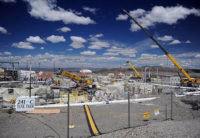The U.S. Energy Dept. has agreed to pay $925,000 to Washington state, a plumbers’ union local and a watchdog group, and to expedite mitigation steps and new technology in settling a 2015 lawsuit over hazardous vapors at the Hanford nuclear waste cleanup site near Richland, Wash.
The pact reimburses plaintiff costs and sets parameters for new efforts to destroy vapors from stored radioactive materials, but it could restart litigation based on progress in three years, says Bob Ferguson, state attorney general.
Filed in federal district court in Spokane, the suit followed numerous allegations and studies over the past 20 years of worker illnesses linked to vapor exposure from cleanup of site nuclear waste stored in 177 underground tanks, many of which are leaking.
Ferguson said about 1,500 volatile chemical gases, including many that are carcinogens, have been found in the tanks. The court rejected in 2016 DOE’s effort to have the suit dismissed, alleging that not enough workers were getting sick.
The pact mandates DOE to complete phased testing, using both simulated and actual tank waste, of one system anticipated to capture or destroy up to 99% of toxic substances vented from tanks. It is designed to pull tank vapors into a combustion chamber to reduce organic chemical concentration, says the agreement. Mercury would be filtered and removed.
The agency, through its AECOM-led site contractor, Washington River Protection Solutions, also has already been testing a modified strobic air ventilation system, says firm spokesman John Britton.
He says that system, being tested offsite in Philadelphia and Richland, uses jet turbines to send vapors high into the air. “We are supposed to have testing done by the end of the year and make a decision to deploy at the tank farm … to see how it works in an actual field situation,” he says.
Hanford workers will continue to use supplied air during waste-disturbing work at tank sites, a practice added after the suit.
The pact assigns 55% of settlement funds to the state, with United Association Local 598 and activist group Hanford Challenge sharing the rest.




